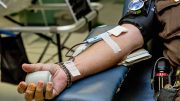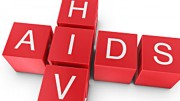 By: Mike Givens*/TRT Assistant Editor—
By: Mike Givens*/TRT Assistant Editor—
On November 17, fading movie and television star Charlie Sheen announced publicly that he has HIV. You’re probably familiar with Sheen’s public antics, from his reported sexcapades with adult film actresses and sex workers to his alleged substance abuse.
In his “TODAY” interview with journalist Matt Lauer, Sheen proceeded to relate a cringe-inducing narrative. According to the actor, blackmail attempts cost him millions of dollars. The interview featured Lauer peppering Sheen with questions about his sex life, substance abuse, and mental health issues. In a second segment, Sheen’s celebrity doctor, Robert Huizenga, appeared to clarify the fact that his client has HIV, not AIDS, contrary to earlier media reports. Huizenga’s presence in the interview alone was discomforting and forced; a staged attempt to dispel tabloid gossip.
The years of substance abuse and sex addiction had clearly taken a toll on Sheen, who is only 50, but it was quite evident that he’s suffering immensely under the cultural stigma borne out of the HIV/AIDS epidemic.
I don’t care about Charlie Sheen’s personal life, but I do care about the discussions that his HIV status will launch in the wake of his confession. Sheen’s lifestyle will be generalized and denigrated and the dialogue around the HIV/AIDS epidemic could be set back by several years.
Instead of treating those living with HIV/AIDS as lepers, we should be proactive in supporting them, by fighting the illness head on. Here are just a few ideas on how we can do that:
- Changing Our Language: The English language has devolved into a colloquial catastrophe. It’s not uncommon for men who have sex with men (MSM) to ask such questions about being “clean” when discussing the possibility of sex (“clean” meaning free of HIV/AIDS and/or other sexually transmitted infections). But it’s more than just the new definitions we ascribe to words. It’s the ignorance we attach to them. The debilitating stigma accompanying an HIV/AIDS diagnosis has grown over the years and people are terrified of discussing their status for fear of social rejection. There’s also the misconception that an HIV/AIDS diagnosis is somehow a function of promiscuity or rampant drug use. While this can be the case, it’s by no means always the case. As a society, we need to refocus our dialogues to discuss prevention of HIV/AIDS and not persecuting those who have the illness.
- Changing Our Laws: In several states we’re seeing lawsuits filed in criminal and civil courts against individuals who allegedly knew they were transmitting the virus during sexual contact with another person. I’ll be honest and say that I wrestle with the morality of suing or prosecuting someone for knowingly transmitting HIV/AIDS. There are heinous implications when the law can be weaponized to further stigmatize a condition that is not a death sentence. What I feel unequivocally is that each state needs to weigh the legal ramifications of penalizing sexual behaviors with the ethical implications of vilifying those living with a treatable condition.
- Knowing the Resources that are Available: Since the genesis of the HIV/AIDS epidemic in the late 1970s and early 1980s, there has been myriad treatments and medicines developed to treat the condition. There’s PReP (pre-exposure prophylaxis, also known as Truvada), PEP (post-exposure prophylaxis) and a range of prescription medicines that have effectively transitioned HIV/AIDs from a life-ending disease to a manageable lifelong condition. But these measures are of no use if we aren’t educating the public about what they are and how to access them. Let’s prioritize prevention over reaction when managing our own sexual behaviors. Informative, non-judgmental resources that responsibly talk about sex should be lifted up more often in public discourse. Education is paramount to prevention and will go a long way in facilitating informed decisions that minimize risk without diminishing the rewards of an active, healthy sex life.
In the more than 30 years since the discovery of HIV/AIDS, scientific advancements have allowed many people to live long, healthy lives. However, we’re seeing rampant increase in diagnoses in communities of color because of the social stigma around same-sex relationships, which has forced many men to live on the “down low,” a troubling phenomenon of “straight” men secretly engaging in high-risk sex with other men. This stifling level of silence and repression (and oppression) is an ideal breeding ground for a lack of awareness and dialogue around safe sex practices.
The battle against HIV/AIDS must be fought on two fronts: one that is scientific, the other is social. We’ve made an impressive amount of progress in managing the epidemic, producing treatments that maintain higher T cell counts and healthier immune systems. However, socially, we’re battling ignorance, prejudice, and misinformation, which can be just as deadly as the virus itself.
Charlie Sheen is an actor, an alleged substance abuser and womanizer, and is notoriously portrayed by the media as difficult and uncompromising. Regardless of his reputation, the core thread that needs to run through any conversation about his HIV status, and the dialogue around the epidemic in general, is that this is a disease that affects human beings. The moment we strip away the humanity of the people living with the disease is the moment we ourselves reinforce its deadliness.
*A graduate of the Boston University College of Communication, Mike Givens has been a social justice advocate for more than seven years. During that time he’s worked on a range of initiatives aimed at lifting up marginalized populations. An experienced media strategist and public relations professional, Michael currently devotes his spare time to a number of vital issues including racial justice and socioeconomic equity.







